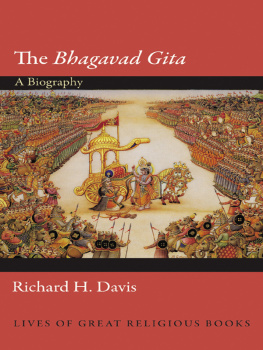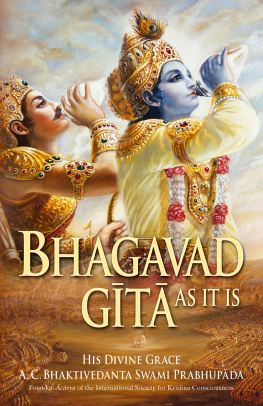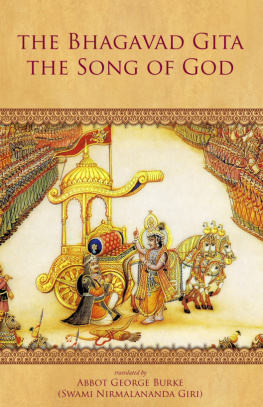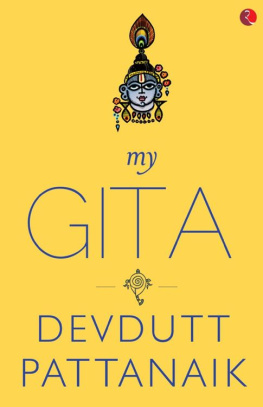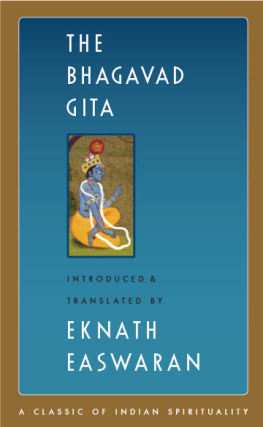
LIVES OF GREAT RELIGIOUS BOOKS
The Bhagavad Gita
LIVES OF GREAT RELIGIOUS BOOKS
The Dead Sea Scrolls, John J. Collins
The Bhagavad Gita, Richard H. Davis
The Book of Mormon, Paul C. Gutjahr
The Book of Genesis, Ronald Hendel
The Book of Common Prayer, Alan Jacobs
The Book of Job, Mark Larrimore
The Tibetan Book of the Dead, Donald S. Lopez, Jr.
Dietrich Bonhoeffers Letters and Papers from Prison, Martin E. Marty
Thomas Aquinass Summa theologiae, Bernard McGinn
The I Ching, Richard J. Smith
The Yoga Sutras of Patanjali, David Gordon White
Augustines Confessions, Garry Wills
FORTHCOMING:
The Book of Revelation, Timothy Beal
Confuciuss Analects, Annping Chin and Jonathan D. Spence
Josephuss Jewish War, Martin Goodman
John Calvins Institutes of the Christian Religion, Bruce Gordon
The Lotus Sutra, Donald S. Lopez, Jr.
C. S. Lewiss Mere Christianity, George Marsden
The Greatest Translations of All Time: The Septuagint and the Vulgate, Jack Miles
The Passover Haggadah, Vanessa Ochs
The Song of Songs, Ilana Pardes
The Daode Jing, James Robson
Rumis Masnavi, Omid Safi
The Talmud, Barry Wimpfheimer
The Bhagavad Gita
A BIOGRAPHY
Richard H. Davis
PRINCETON UNIVERSITY PRESS
Princeton and Oxford
Copyright 2015 by Princeton University Press
Published by Princeton University Press, 41 William Street,
Princeton, New Jersey 08540
In the United Kingdom: Princeton University Press, 6 Oxford Street,
Woodstock, Oxfordshire OX20 1TW
press.princeton.edu
Jacket illustration B. G. Sharma. www.bgsharmaart.com
All Rights Reserved
Library of Congress Cataloging-in-Publication Data
Davis, Richard H., 1951
The Bhagavad Gita : a biography / Richard H. Davis.
pages cm (Lives of great religious books)
Summary: The Bhagavad Gita, perhaps the most famous of all Indian scriptures, is universally regarded as one of the worlds spiritual and literary masterpieces. Richard Davis tells the story of this venerable and enduring book, from its origins in ancient India to its reception today as a spiritual classic that has been translated into more than seventy-five languages. The Gita opens on the eve of a mighty battle, when the warrior Arjuna is overwhelmed by despair and refuses to fight. He turns to his charioteer, Krishna, who counsels him on why he must. In the dialogue that follows, Arjuna comes to realize that the true battle is for his own soul. Davis highlights the place of this legendary dialogue in classical Indian culture, and then examines how it has lived on in diverse settings and contexts. He looks at the medieval devotional traditions surrounding the divine character of Krishna and traces how the Gita traveled from India to the West, where it found admirers in such figures as Ralph Waldo Emerson, Henry David Thoreau, J. Robert Oppenheimer, and Aldous Huxley. Davis explores how Indian nationalists like Mahatma Gandhi and Swami Vivekananda used the Gita in their fight against colonial rule, and how contemporary interpreters reanimate and perform this classical work for audiences today. An essential biography of a timeless masterpiece, this book is an ideal introduction to the Gita and its insights into the struggle for self-mastery that we all must wageProvided by publisher.
Includes bibliographical references and index.
ISBN 978-0-691-13996-8 (hardback)
1. BhagavadgitaHistory. 2. BhagavadgitaCriticism, interpretation, etc. I. Title.
BL1138.66.D38 2014
294.5'92409dc23
2014023890
British Library Cataloging-in-Publication Data is available
This book has been composed in Garamond Premier Pro
Printed on acid-free paper.
Printed in the United States of America
10 9 8 7 6 5 4 3 2 1
CONTENTS
ILLUSTRATIONS
ACKNOWLEDGMENTS
I am grateful to Fred Appel for asking me to work on a biography of the Bhagavad Gita. His invitation set me on a journey that has been challenging and rewarding, and it is not over yet.
In the course of my work on this biography, Ive profited from the conversations, enthusiasm, and suggestions of many friends and colleagues. At Bard College, my colleagues Sanjib Baruah, Bruce Chilton, and Carolyn Dewald all read portions of this work and gave valuable comments. Kristin Scheible read through a full draft of the manuscript with her class on Reading Religious Texts, to see how well it would work as an undergraduate course book. I appreciate the comments and advice of Dennis Dalton, Joshua Greene, Brian Hatcher, Jack Hawley, Gene Irschick, Jon Keune, Steve Lindquist, Donald Lopez, Christian Novetzke, Phil Oldenberg, Rosane Rocher, Steve Rosen, Gordon Stavig, and Tom Trautmann on various portions of this work. I am also grateful for the thoughtful suggestions of the anonymous readers at Princeton University Press.
In India, many people helped me during work on this project; I can single out only a few. In Delhi, I appreciate the invitation of Jyotindra Jain and Kavita Singh to present some of my work at Jawaharlal Nehru University, and the vigorous comments of the faculty and students there. In Mumbai, Rashmi Poddar and Shekhar Bajaj gave me much needed assistance, and in Wardha, I was aided by Bharat Mahodaya and Ashok Mehre. For my visits to Kurukshetra, I am grateful for the help and friendship of Rajendra S. Rana and Anand Pal Tomar. For my time in Pune and Alandi, I thank Sucheta Paranjpe for her assistance.
I have been lucky to have the opportunity to present talks growing out of my work on the biography of the Gita at Barnard College, Brown University, Harvard University, Luther College, Tufts University, the University of Michigan, and Yale University. I thank audiences at all of these talks for their stimulating questions.
I am grateful to the National Endowment for the Humanities for a fellowship that enabled me to work full-time on this book, and to Bard College for its support of continuing faculty research. Finally, I wish to acknowledge my gratitude to the students at Bard College over many years who have patiently read through the Bhagavad Gita with me and who have engaged in their own dialogues with Krishna.
LIVES OF GREAT RELIGIOUS BOOKS
The Bhagavad Gita
Introduction
Dhritarashtra asked: When my troops and the Pandavas met together, itching for battle, at Kurukshetra, the field of dharma, what happened, Sanjaya?
Bhagavad Gita 1.1
The Bhagavad Gita opens on a field of battle. At Kurukshetra, two massive armies led by the Pandavas and Kauravas have assembled. All the rulers along with the entire warrior class of India are involved, siding with one camp or the other. Leaders blow thunderously on conch shells, while drums and cymbals create a cacophonous roar. Warriors are slapping their arms in eager anticipation. Nearby, packs of jackals and flocks of crows have also assembled, looking forward to a feast of human flesh.
Just as the battle is about to commence, Arjuna, the leading warrior of the Pandava side, asks his charioteer Krishna to station his vehicle in between the two vast forces. I want to look at the men arrayed here so eager for war, he explains, and Krishna drives his chariot into the no-mans-land. At this moment, Arjuna is overcome with anxiety and despair. He drops his bow and threatens to renounce the battle altogether. It is Krishnas task to persuade Arjuna to overcome his doubts.
Next page
